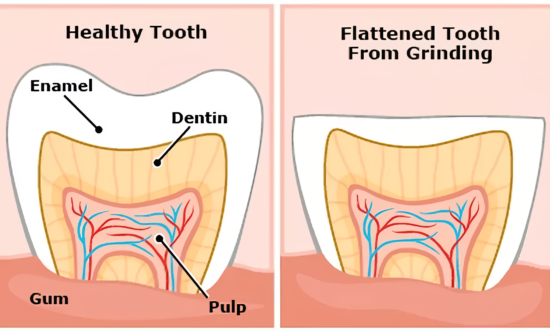
Bruxism, a condition characterized by repeated grinding and/or clenching of your teeth, affects many people. This can occur at any time, though it is most prevalent at night, taking place while you are sleeping. Though it may not seem serious, if it persists, bruxism can cause a number of issues to both your oral and general health.
If you are looking to learn more about bruxism treatment in Millwoods, we highly encourage you to speak with a member of our local dental team. They can answer all your questions about what this process entails.
Common Symptoms
Identifying the symptoms associated with bruxism can be difficult since many of these signs can be related to other conditions. Below are some of the most common symptoms of bruxism; if you are dealing with any of these, it may be time to contact a dentist near you.
- Cracked, chipped, or flattened teeth
- Sensitivity
- Enamel erosion
- Tight or sore jaw and neck muscles
- Difficulty chewing
- Trouble sleeping
- Earaches
Do not leave bruxism untreated. It is essential that you talk to a dental professional about what you are experiencing. They will invite you to come in to discuss your case in detail. Gathering this information will help them identify the best treatment moving forward.
What Causes Bruxism?
Bruxism can occur throughout the day (awake bruxism) and at night (sleep bruxism). It affects approximately 10% of adults and 15% of children.
The former can arise due to chronic anxiety, stress, or anger. These emotions can physically manifest in the form of teeth grinding when you concentrate or are coping with something difficult.
In comparison, the latter can be linked to a sleeping disorder like night terrors or sleep apnea or taking medications like antidepressants. Sleep bruxism can also be hereditary. This form of bruxism can be especially tricky to remedy since it often happens unconsciously. Patients can exert up to 250 pounds of force onto their smiles while sleeping, leading to migraines or painful jaw dysfunction.
Treating Bruxism
It’s important to seek out a dentist in Millwoods to acquire proper bruxism treatment. They will evaluate your oral cavity and assess your jaw and neck muscles. They will also discuss your general oral hygiene with you and ask about your specific symptoms. Depending on the case, you may be referred to a sleep specialist or a doctor.
Fortunately, there are multiple ways to manage bruxism and prevent it from causing further damage; medications cannot be used.
- Dental Guards — Dental guards act as a cushion, separating your top and bottom row of teeth from coming into contact. Though you can acquire over-the-counter devices, the best option is a customized guard provided by a dentist. They will take impressions of your mouth, so the guard fits you exactly. You can wear a dental guard during the day and at night.
- Mediation and Exercise — Training your body to relax can help prevent bruxism by releasing tension in your neck, shoulder, or jaw muscles. Along with daily exercise, these activities will also reduce your stress levels.
- Therapy — Cognitive behavioural therapy (CBT) is an alternative way to address bruxism. Strategies are designed according to your individual needs. CBT is aimed at managing mental health conditions like grief and depression, which can contribute to bruxism and insomnia. Professional therapy will help you identify your thoughts and emotions to develop healthier coping methods.
- Botox — Botox injections aren’t just for cosmetic purposes; they can be used in medical settings, too. The serum is injected at the appropriate site, temporarily freezing your muscles, meaning they cannot contract. As a result, this allows them to relax. Dentists with the proper qualifications can administer Botox. Results last about three months.
- Oral Surgery — Dental surgery to treat bruxism is performed in the most severe cases. Dentists typically recommend less aggressive and invasive approaches first. Corrective jaw surgery can fix a dislocated jaw or damaged TMJ joints, which attach your lower mandible to the base of your skull. You’ll most likely be referred to an oral and maxillofacial surgeon.
Visit Agape Dental Today for Reliable Dental Care
At our neighborhood dental practice, we provide bruxism treatment near you. You do not have to live with oral pain any longer; contact our staff to schedule an appointment right away! We look forward to collaborating with you soon.

